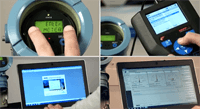 Coriolis mass flow and density measurement is used in a multitude of applications such as custody transfer, dirty/wet gas, cryogenic, critical phase fluids, sanitary, corrosive liquids, and more.
Coriolis mass flow and density measurement is used in a multitude of applications such as custody transfer, dirty/wet gas, cryogenic, critical phase fluids, sanitary, corrosive liquids, and more.
Emerson’s Micro Motion team has put together and excellent 4:10 educational video, Reduce Downtime w/ Micro Motion Smart Meter Verification, on the components in Coriolis meters and how smart meter verification (SMV) works to assure the meter is operating safely, within specification, and up to its full potential.
At 0:26 into the video, it highlights the operation and components in Coriolis flow measurement. An important component is the factory calibration performed on a NIST traceable test stand. An SMV test is also performed on the sensor and transmitter components to get benchmarks against which to compare future tests.
The SMV test checks the components of the meter including the drive coil that vibrates the flow tubes, the two pickoff coils that measure the Coriolis force exerted on the tubes, the RTD temperature sensor, and the stiffness of the flow tubes. The stiffness directly correlates to a meter’s flow and density measurement accuracy.
The SMV test verifies that the hardware and software are working properly and compares the results against the original factory test and the original field installation SMV test baseline. As long as there are no changes to the SMV signature, the meter is repeatable and has maintained its original factory condition. The SMV test also checks for any configuration changes or meter re-zero operations that may have impacted performance.
